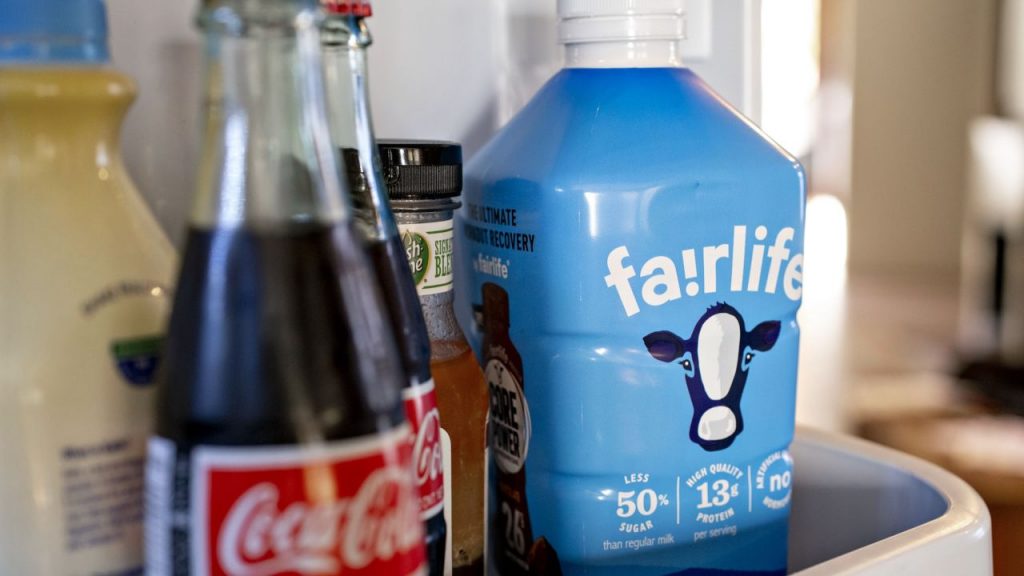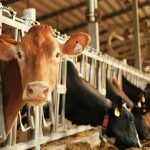
When James Quincey became CEO of Coca-Cola in 2017, soda had broadly been in decline over its health effects. The beverage giant was embarking on an effort to diversify its reach beyond the sugary drink.
A key move? Ditching the carbonation and sticking to the basics: cow milk.
Launched in 2012, Fairlife — originally founded as a joint venture between Coca-Cola and wholesale dairy producer Select Milk Producers — used whimsical, minimalistic packaging that fits with the influx of niche almond, protein and even pistachio milks, outperforming large-container beverages in the dairy aisle.
In 2020, Coca-Cola fully acquired Fairlife for an initial $980 million — an acquisition that has far exceeded the soda giant’s expectations due in part to social media popularity in the health and wellness space. While Americans face higher food prices and a pullback in their spending, they’re still drawn to Fairlife’s ultra-filtered system that draws out lactose and sugar but doubles the protein.
In 2022, Coca-Cola announced that Fairlife’s sales surpassed $1 billion.
The success is driven by Fairlife’s Core Power protein shake brand, which remains a popular staple at many grocery stores and does not have many direct market-leading competitors.
But in its latest earnings call last week, Coca-Cola projected some moderation of Fairlife’s growth in 2025 while it builds a facility in New York and carbonated beverages still make up the overwhelming majority of sales for Coca-Cola (its competitor, Pepsi, on the other hand, leans on its Frito-Lay snack brand). And when compared to Coca-Cola’s other big acquisition in the non-soda space — Costa Coffee in 2018 — Fairlife has far outpaced it.
“The expectations were never for Fairlife to be this successful, I think even for Coke,” said Kaumil Gajrawala, an analyst for finance firm Jeffries.
The acquisition was structured so there would be an earn-out — meaning the amount paid will ultimately be based on the milk brand’s success. In deals like this, the buyer could pay less than buying outright if they’re not sure a product will be successful, Gajrawala said.
The total payment for the acquisition is now looking to be $6.2 billion, plus the $980 million Coke initially paid, according to Coca-Cola’s latest earnings report. That would make it among Coke’s priciest acquisitions to date.
“Dairy has been tricky for Coke to get into,” Gajrawala said. “Nothing will ever be as important as a Coke trademark, but this is a nice contributor to growth.”
Cashing in on wellness
The North American market has shown it will invest in health, whether it’s Vital Farms’ free-range eggs or Fairlife’s protein-dense milk. Coca-Cola entered the right category at the right time, Citi analyst Filippo Falorni told CNN.
“You had a more health-conscious consumer in the United States, and particularly with a bigger focus on protein intake over the last couple of years,” Falorni said.
Protein shakes are a $6 billion market, according to Beverage Digest, a global non-alcoholic beverage industry trade publication.
Grocery items in the middle-priced range are often what Americans decide to stop buying, Gajrawala said. Consumers are either looking for the lowest-priced product or are willing to pay a lot more for something that’s differentiated.
Fairlife, with its successful branding, has managed to pull off the latter, Gajrawala said. And it also benefits from Coca-Cola’s behemoth distribution system, which Falorni said is arguably the best in the world.
Risks to growth
TikTok users frequently post themselves drinking Core Power before a workout or making a healthier morning iced coffee using Fairlife’s milk.
But just as quickly as items go viral on social media, they can also fall out of trend, especially in the health and wellness space.
Additionally, in 2022, Fairlife and Coca-Cola agreed to a $21 million settlement in a class-action lawsuit over allegations of inhumane treatment of its cows. The lawsuit claimed consumers were falsely charged a premium because Fairlife promoted well-treated cows.
Last year, Fairlife broke ground on a massive production facility in New York state, but Coca-Cola “is going to look for more categories” to expand its offerings, Falorni said.
Coca-Cola is “very focused on Fairlife because it’s going very nicely. But I don’t think they’re going to stop there in terms of the portfolio diversification,” he said.
You can now read the most important #news on #eDairyNews #Whatsapp channels!!!
🇺🇸 eDairy News INGLÊS: https://whatsapp.com/channel/0029VaKsjzGDTkJyIN6hcP1K

























